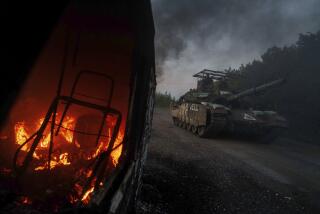Bosnian Serbs Enter Besieged Muslim Enclave
- Share via
VIENNA — Bosnian Serb rebels infiltrated the center of Srebrenica on Friday, triggering outrage from the international community and raising the prospect of an early surrender of the last major Muslim stronghold in eastern Bosnia-Herzegovina.
The French Foreign Ministry in Paris said Serbian forces had entered the Muslim enclave that has been under siege for more than a year.
The Office of the U.N. High Commissioner for Refugees in Geneva ordered its workers in the former Yugoslav federation to prepare for the evacuation of the entire population of Srebrenica, which is overflowing with hungry and homeless Muslims uprooted from other areas vanquished by the Serbs.
About 150 Canadian peacekeeping troops of the U.N. Protection Force were dispatched to the region, but their mission was clearly to assist in evacuating victims rather than to mount any defense of the doomed enclave.
“Its role will be to assist in the evacuation of wounded and to try to stabilize the situation,” U.N. military spokesman Peter Osborne said of the contingent ordered to deploy today. “I think at this stage it’s just chaos there.”
Friday also witnessed some of the most vicious fighting to date between Bosnian Croats and the Muslim Slavs, who had been allied against the Serbian rebels for most of the past year. Croatian extremists closed roads into central Bosnia to pinch off supplies to the Muslims, and fierce exchanges of heavy artillery fire were reported in the central town of Vitez.
Late Friday, the U.N. Security Council approved a resolution declaring Srebrenica a haven for Muslim civilians facing the Serbian onslaught.
But the resolution included no enforcement provisions, and served as little more than a threat.
The Canadian U.N. contingent headed for Srebrenica today had been prohibited from entering the town a week ago. Bosnian Serb military chief Ratko Mladic, who apparently wanted no foreign deterrence to attacks by his rebels, had vowed that the peacekeeping presence would be bolstered “over my dead body.”
The U.N. Protection Force commander, Gen. Lars-Erik Wahlgren, reportedly won permission to bring the troops to Srebrenica after contacting Serbian President Slobodan Milosevic, who is widely considered the mastermind of the Balkan conflict aimed at creating a Greater Serbia.
The U.N. commander approached Milosevic in an effort “to avert a major humanitarian tragedy in the Srebrenica enclave,” and Bosnian Serbs then agreed “in principle” to allow the Canadians to deploy, said U.N. spokeswoman Shannon Boyd from mission headquarters in the Croatian capital of Zagreb.
Western diplomats in Zagreb and Belgrade speculated that U.N. officials won Serbian reversal on the proposed deployment only because the Bosnian authorities had already agreed to surrender.
The U.N. refugee agency was poised to send as many as 50 trucks to carry Srebrenica civilians out of the town in the event of surrender, and agency field workers were monitoring the situation “minute by minute,” said spokeswoman Lyndall Sachs in Belgrade.
“We have been saying since February that Srebrenica would fall if some protective measures were not taken,” said the refugee office’s Laurens Jolles, who has been at the helm of several aid convoys turned back by the encircling Serbs.
The aid agency estimates there are about 30,000 Muslims trapped by Serbian forces in Srebrenica; other sources put the number as high as 80,000.
U.N. troops and relief workers have often been accused by the Muslim leadership of Srebrenica of assisting the Serbs in their practice of “ethnic cleansing” by providing transportation for those wanting to flee rather than providing the food, medicine and protection that might allow them to stay and defend themselves.
As recently as Thursday, the town’s military commanders refused to let even women, children and elderly board departing relief trucks, demanding that 500 injured fighters first be airlifted out.
Srebrenica has been the target of a Serbian nationalist siege for a full year and has lately faced an intensified rebel offensive aimed at conquering the last non-Serbian areas of the republic’s east.
At least 60 beleaguered civilians were killed by Serbian shelling in the enclave this week.
The worst of the attacks, a fierce artillery assault on Monday, appears to have broken down what little will remained among Srebrenica’s defenders to resist the onslaught of the heavily armed Serbs.
Officials of the Bosnian government told reporters in the capital, Sarajevo, that negotiations were in progress with the rebel Serb leadership of Radovan Karadzic to allow the safe passage of civilians out of Srebrenica in return for its surrender.
Bosnian Serb gunmen, under the direction of nationalist politicians like Karadzic and Milosevic, have already conquered 70% of Bosnia in a drive to seize territory for an expanded Serbia that would unite Serbs now scattered among several Balkan states.
Western governments, appalled by the death and destruction left in the wake of the Serbian rebel advance, have condemned the war’s brutality but done little to deter it.
The U.N. Security Council called a special session to consider harsher economic sanctions against Serbia--a move that had been threatened if the rebels do not accept by April 26 a peace plan crafted by former U.S. Secretary of State Cyrus R. Vance and Britain’s Lord Owen. Under the Vance-Owen proposal to divide Bosnia into 10 ethnic provinces, Srebrenica and the other surviving Muslim enclaves now under siege would be governed by Muslims.
At least 2 million Bosnians have been driven from their homes since Serbian nationalists, opposed to an independent Bosnia, launched an armed rebellion last April. Bosnian government sources claim 200,000 citizens--mostly Muslim civilians--have been killed or are missing and presumed dead.
Special correspondent Laura Silber, in Belgrade, contributed to this report.
More to Read
Sign up for Essential California
The most important California stories and recommendations in your inbox every morning.
You may occasionally receive promotional content from the Los Angeles Times.














